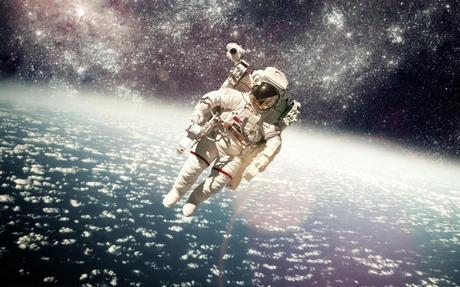In a quiet part of rural Arizona, hundreds of people die after suffering from blood clots almost immediately. Some die mid-pass, while others go 'quietly mad' before committing suicide, often in bizarre ways.
The cause turns out to be a crashed satellite, which brings with it a deadly pathogen from space. A group of scientists from the US Air Force's wildfire team are trying to stop the alien contamination - and prevent a global meltdown.
That is the plot of The Andromeda Strain, Michael Crichton's science fiction bestseller published in 1969. Now, more than fifty years later, American politicians and disaster planners are taking the plot a lot more seriously.
As humanity pushes further into the cosmos and flights to and from space become routine, a new report from the US Bipartisan Commission on Biosecurity has urged governments around the world to "act now to tackle the biological threats suits emerging at the intersection of space exploration and infectious diseases. ."
Forget the little green men of Hollywood folklore. It is not aliens or UFOs that pose the greatest risk, the Commission says, but microorganisms and the rigors of space travel. That, plus the not entirely imaginative use of biological weapons in space.

"Human exploration of the solar system and beyond continues, and with that exploration, biological risks increase," the Commission authors say in their May 2024 National Blueprint for Biodefense.
"Probes or humans visiting extraterrestrial environments should not introduce organisms from Earth into those environments. Conversely, they must also ensure that they do not bring back alien or mutated terrestrial microbes that could threaten the health of people, animals, plants or ecosystems on Earth or the moon."
And it's not just the import and export of pathogens between worlds that the Commission is concerned about. "Spaceflight sometimes reactivates viruses (e.g., herpes, Epstein-Barr, varicella-zoster, cytomegalovirus) and increases virus shedding in astronauts. A human infection in a space-like environment could pose a significant threat to everyone on board," it notes.
"Additionally, space travel severely weakens astronauts' immune systems, making them more susceptible to terrestrial and extraterrestrial diseases."
Astro-biodefense aims to identify, characterize and manage biological threats that arise at the intersection of space exploration and infectious diseases, and the report calls on NASA and the US government to "take action now to address these threats before they become become reality".
Heavenly contamination laboratories
In particular, it calls on NASA to establish a Planetary Biodefense Board with a direct link to the White House and to authorize the NASA Office of Planetary Protection to monitor and to regulate.
"We need to start developing the necessary technologies and containment protocols in advance so that when we bring things back, we can be sure they don't end up in the environment," said JT O'Brien, Commission principal investigator and public health expert , told The Telegraph.
"We need to make sure these things are in order before we tackle this next border."
NASA already ensures that potentially harmful microbes are not transported between Earth and other celestial bodies through various mechanisms, including decontaminating spacecraft and testing equipment and samples, but the report says they 'can and should do more' .
One recommendation is that NASA should adapt its contamination labs to handle potentially high-risk sky samples. After all, it expects to import the first samples from Mars in 2033.
But currently, even the best BSL 4 labs are not considered safe enough to process delicate samples from space, according to a major study published in 2012 by the European Space Foundation.
Some experts believe the dangers of alien pathogens have been exaggerated.
"The risk is quite low in my opinion, and that is because organisms have adapted to it [particular] environment," says Gary Trubl, a microbiologist at Lawrence Livermore National Laboratory who specializes in astrobiology.
"There is a very small chance that we will bring anything back, and if we did, the chance that it would adapt to us is unlikely."
But it's not just alien diseases we have to worry about. Research shows that pathogens can become more contagious in space. Increased radiation levels can cause viruses to mutate more frequently. At the same time, the harsh conditions of space can weaken astronauts' immune systems, making them more susceptible to infections.
"If something were to go up from Earth via a spacecraft, it could look very different," says O'Brien.
This, the Commission notes, could pose a serious risk if an astronaut were to travel to space with a respiratory virus, such as Covid or influenza, and then return with a super-mutated version.
"The environment can make viruses much more deadly and potentially dangerous to people here on Earth," O'Brien said.
Since the first manned mission to the moon, NASA has taken steps to protect the health of crew members, and strict quarantine measures both before and after space missions ensure that disease outbreaks on board are low - but it is still a possibility.
"For the Apollo missions, the standard was 21 days of quarantine - but you have to think about how many pathogens we have on Earth that require months or even years of incubation," said Dr. Jeffrey Kargel, senior scientist at the Planetary Science Institute.
While these risks could be decades in the future - or may never materialize - the message from scientists and experts is that more research is needed to understand the impact of space travel on life on Earth.
Increased biodefense on NASA's part is a starting point, Mr. O'Brien emphasized, but it doesn't just apply to them. As more countries and companies invest in space, they too must implement stricter regulations and protections.
The danger of not doing this was laid out all those years ago in the Andromeda tribe.
The Telegraph has contacted NASA for comment.
Protect yourself and your family by learning more about it Global healthcare